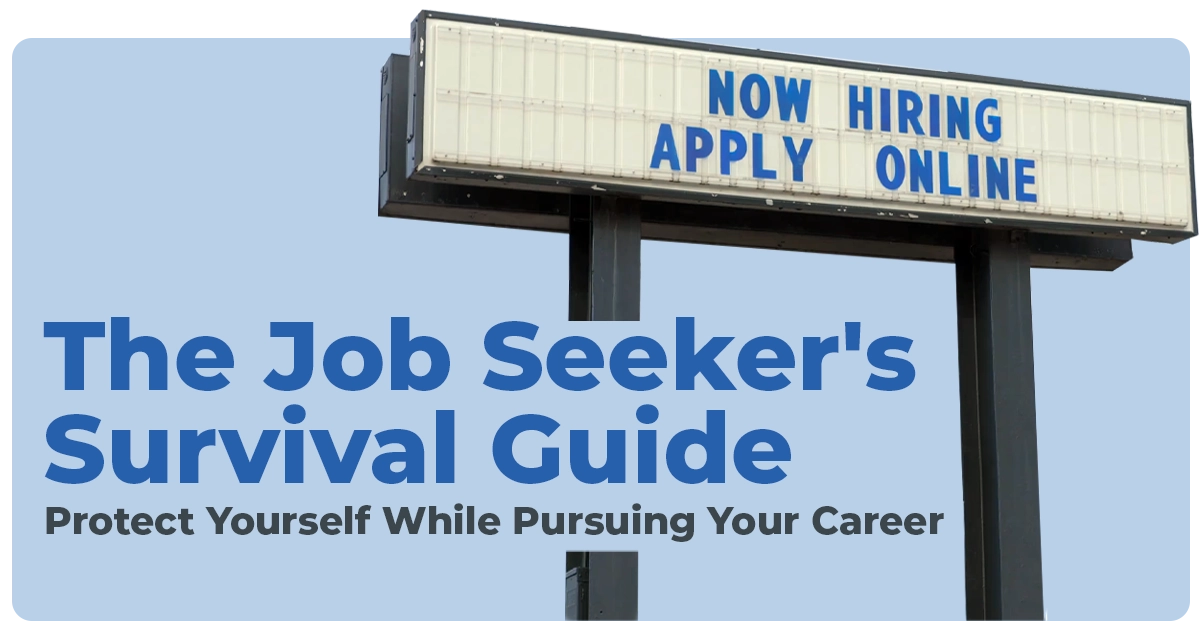Job hunting used to mean putting on your best outfit, printing out a crisp resume, and showing up to interviews with a confident handshake. These days, the internet has transformed the process into endless online applications. Job seekers often find themselves scouring internet job boards, uploading cover letters and resumes into a black hole, and filling out applications that feel like a full-time job in themselves. But while you’re focused on landing your next opportunity, scammers are focused on landing you.
Let’s face it – job hunting is a grind. Job seekers face a minefield of frustrations: vague job descriptions with a lack of transparency about pay, outdated listings, unresponsive hiring managers, and endless automated application systems that never seem to lead anywhere.
If you’ve been on the hunt for a job lately, you’ve probably poured hours into applications that make you repeat what’s already on your resume or been forced to take bizarre personality quizzes to prove you’re a team player, all just to get a soul-crushing auto-rejection or straight-up ghosted. It’s no wonder so many people feel discouraged and defeated.
Here’s the real danger: scammers know you’re frustrated. They prey on your exhaustion, your hopes, and your desire to find decent work – and they use that to their advantage.
The Rise of Job Scams
Despite the headaches, many turn to the online job market to find work, navigating through thousands of listings on job sites like Indeed, Monster, and LinkedIn, or watching for opportunities on social media platforms.
Scammers know this, too. They lurk behind fake job listings with the perfect bait – a job opportunity with great pay where you can work from home with flexible hours. The best part? The “recruiter” is very responsive and interested in you!
Kitboga and the Seraph Secure scam investigation team got down to business and took a deeper look at some of these job scams. We receive reports about fake job scams nearly every day. Victims think they’ve landed a legitimate job… until the curtain is pulled back and the truth is revealed. While the stories vary, the tactics and red flags scammers use are often the same.
We’ll break down how these scams work so you can recognize the warning signs before it’s too late.

The Bait: Fake Job Postings & Easy Money
Job board websites and social media are littered with fake job postings from scammers, complete with detailed descriptions and enticing benefits that seem tailor-made for your skills and aspirations. They may offer:
High pay for minimal work
No experience or education required
Full-time remote with flexible hours
Bonuses for simple tasks like writing reviews or liking videos
Some scammers get more creative. They may rope you into a “logistics” job that involves reshipping packages – often full of stolen or illegal goods – unknown to you.
There are also mystery shopper scams where scammers ask victims to visit stores, evaluate customer service, and sometimes even buy gift cards to “test the system.”
And then there are the jobs for a “payment processor,” “financial agent,” or “account manager” where you’re asked to move money between accounts or accept and transfer payments. These are classic signs of money mule scams which can have serious legal consequences.
The promise of quick wealth and financial security can cloud judgment and lead victims down a path of financial ruin. That old saying we’ve heard so many times “If it sounds too good to be true…” still applies.

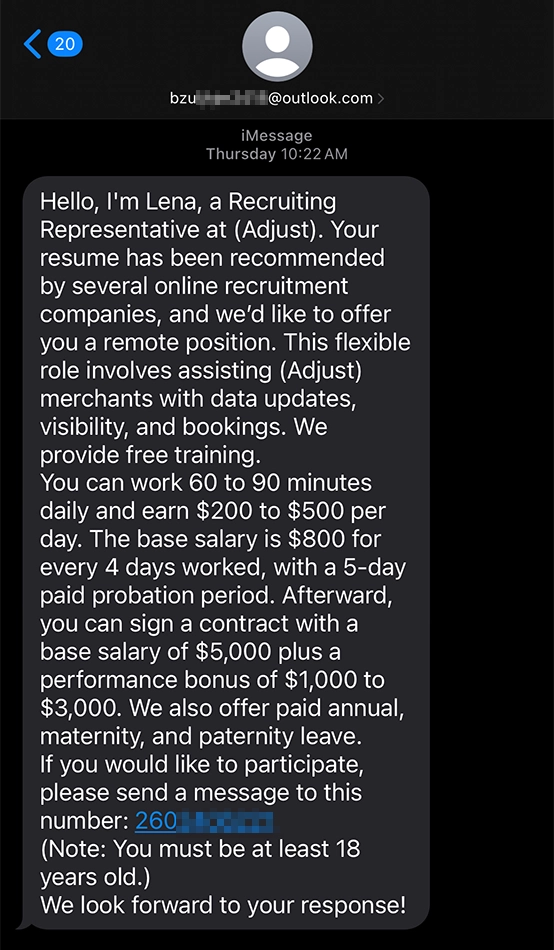

Impersonating Real Companies
Some job scammers will pose as recruiters for real, well-known companies. They might use fake email domains, stolen logos, or spoofed company profiles on social media or job boards. While job boards can be quick to take these postings down, some scammers will reach out to you directly via email or text.
Tip from the scam experts: While company recruiters reaching out to potential talent is not unheard of, you should always verify the opportunity is real before you proceed. Go directly to the company website and look for the role on their careers page. If you’re still unsure, reach out to the company’s HR department directly to verify.

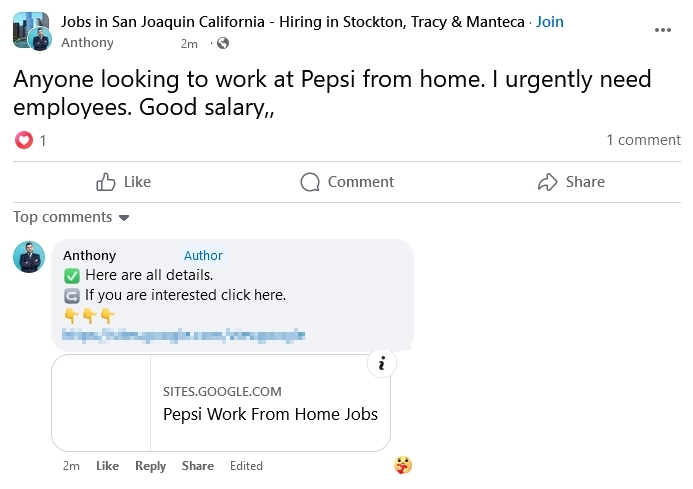
The Hook: “You’re hired!”
Once you show interest in a scam job posting, scammers get to work. You might be “hired” on the spot, no real interview needed. Or, you may go through a staged one to make things feel legitimate.
Then comes the request for personal information for “payroll” or “onboarding” – your Social Security number, bank account, and copies of identification like your driver’s license or passport – all normal things for a real job.
Tip from the scam experts: Before handing over any sensitive info, research the company. Search “[Company Name] + scam”, “+ complaint”, and “+ reviews”. No results doesn’t always mean it’s safe, but it could uncover potential problems.
Some scammers will even send you a W-4 tax form (or your country’s equivalent). Anyone can access this form from the IRS website and jobs do require you to fill this out if you are brought on as an employee, but scammers use it to look official while collecting your personal information.
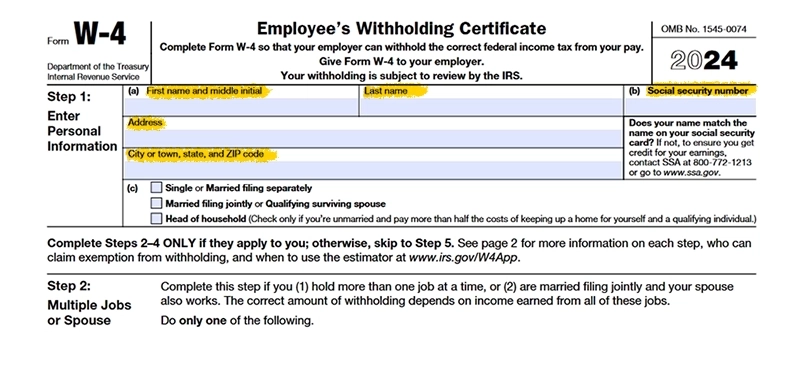
Once they have your personal information, they can steal your identity or sell it to other scammers. We’ve even seen scammers using a job scam victim’s stolen ID in a completely different scam: a fake rental listing. The scammer posed as a landlord and used the victim’s real driver’s license to build trust with new targets.
Upfront Fees & Overpayment Scams
Many scammers will ask for money up front to cover hiring costs such as training materials, background checks, or equipment. They dangle the promise of a high-paying job or a once-in-a-lifetime opportunity, but only if you're willing to send the payment.
Legitimate employers typically cover these hiring expenses themselves or may take the cost out of your first paycheck if they don’t, but they should always be transparent about it. Scammers say it’s just “part of the process”, but real employers don’t make you pay to work. If someone is demanding payment before you’ve started, you may be dealing with a scammer.
The Fake Check Swindle
In some scams, instead of asking you to send money, scammers send you a check to cover equipment costs or as a payment for work done. Here’s the problem: these checks are fake, but it’s not always easy to tell.
Fake check scams are classic cons that have stood the test of time for scammers, but they’re more than just old tricks, they’re the foundation for many job scams today.
These counterfeit checks look real and can have logos, watermarks, and even security features that can trick both you and your bank.
Tip from the scam experts: Even cashier’s checks can be faked. Scammers know they are often viewed as more “trustworthy” since they’re backed by a financial institution instead of the checking account holder, but they can be replicated by scammers the exact same way.
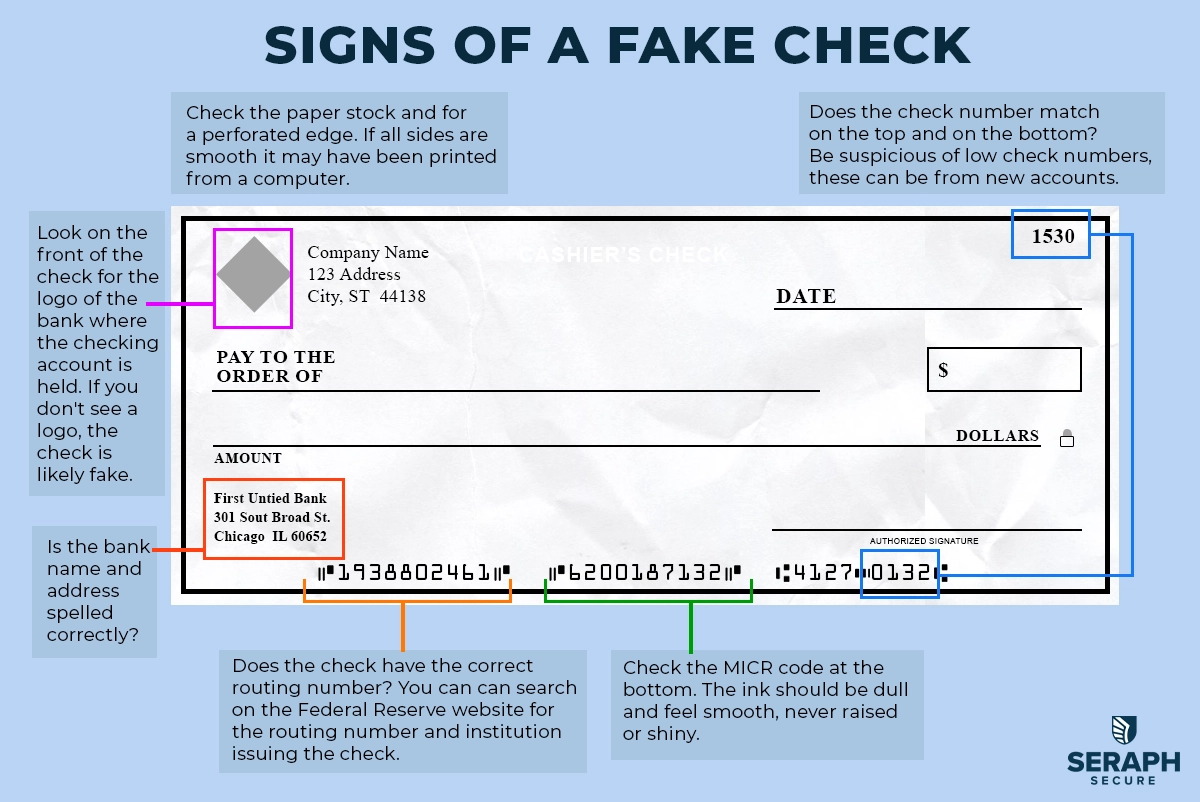
Once the fake check lands in your hands, the scammer will instruct you to deposit the check into your bank account, and since banks have a legal obligation to make that money available to you quickly, the check clears and the money appears available to you to use.
Here’s the issue – since the check is fake, it will inevitably bounce. It could take a few days or even a few weeks for your bank to notice, but it gives a perfect window of time to be exploited by the scammer.
In the meantime, while you’re in limbo with the bank, the scammer will ask you to send part of the money back, or require you to purchase equipment from their approved supplier (them).
The Fallout: Real Consequences from Fake Jobs
Once your bank catches on, they will reverse the deposit leaving your account in the red. Any money you sent to the scammer was your own. To rub salt in the wound, your bank may stick you with an overdraft fee or returned check fee.
There are also potential legal consequences. Passing a counterfeit check is a criminal offense, and while you’re a victim of a scam, you may still face scrutiny from your bank and potentially law enforcement.
And the scammer? They disappear after getting their payday, leaving you to clean up the mess.
How to Stay Safe While Job Hunting
Job hunting can be challenging enough – you don’t need to be dealing with scammers on top of it. But you don’t have to navigate it alone or unprepared. We encourage you to approach any opportunity with a healthy amount of skepticism and always ask questions – only scammers will take issue with this.
Here are some tips to help give you a smoother and safer job search experience:
Do your research. Looking up the company or job before you get involved can save you a major headache down the road. Investigate the company website and look at their job listings, check their social media presence, verify their contact information, and make sure the person who contacted you actually works for that company. Look for grammar and spelling mistakes or anything that looks or feels “off”. Legitimate companies will have a professional online presence.
Use reputable job boards. Stick to trusted job boards that vet and monitor listings. Even then, be cautious – scammers slip through. Watch out for listings offering high pay for low effort or vague responsibilities. Meet every potential job listing with a degree of skepticism until you can verify it.
Be skeptical of cold offers. If you’re contacted out of the blue about a job or offered the position without a proper interview, it could be a scam. Legitimate employers typically don’t make job offers without conducting interviews and verifying your qualifications. Text-based interviews and hiring without checking your credentials are major red flags.
Don’t be rushed. Real employers will not rush the hiring process or get upset at you for taking time to verify things, but scammers will. They want you to act fast so you don’t have time to think. If you feel rushed or pressured at any point, or things feel like they’re moving too fast, you could be dealing with a scammer.
Never pay for a job. Legitimate companies will not ask you to pay for equipment, background checks, or training up front. If there are any costs, they should be clearly explained and are typically deducted from your first paycheck. Paying a fee to apply for a job is not standard practice and could indicate a scam.
Protect your personal information. Always be cautious about sharing sensitive personal information, such as your Social Security number, bank account details, or ID until you’ve verified the employer.
Talk to someone you trust. If you're unsure about a potential job opportunity, seek advice from friends, family, or trusted professionals. A second opinion can help you spot red flags that you may have missed.
Above all else, trust your gut. Keep an eye out for poor communication, vague job descriptions, too-good-to-be-true offers, rushed timelines, and unprofessional behavior from the employer. If something seems off, trust your intuition and walk away.
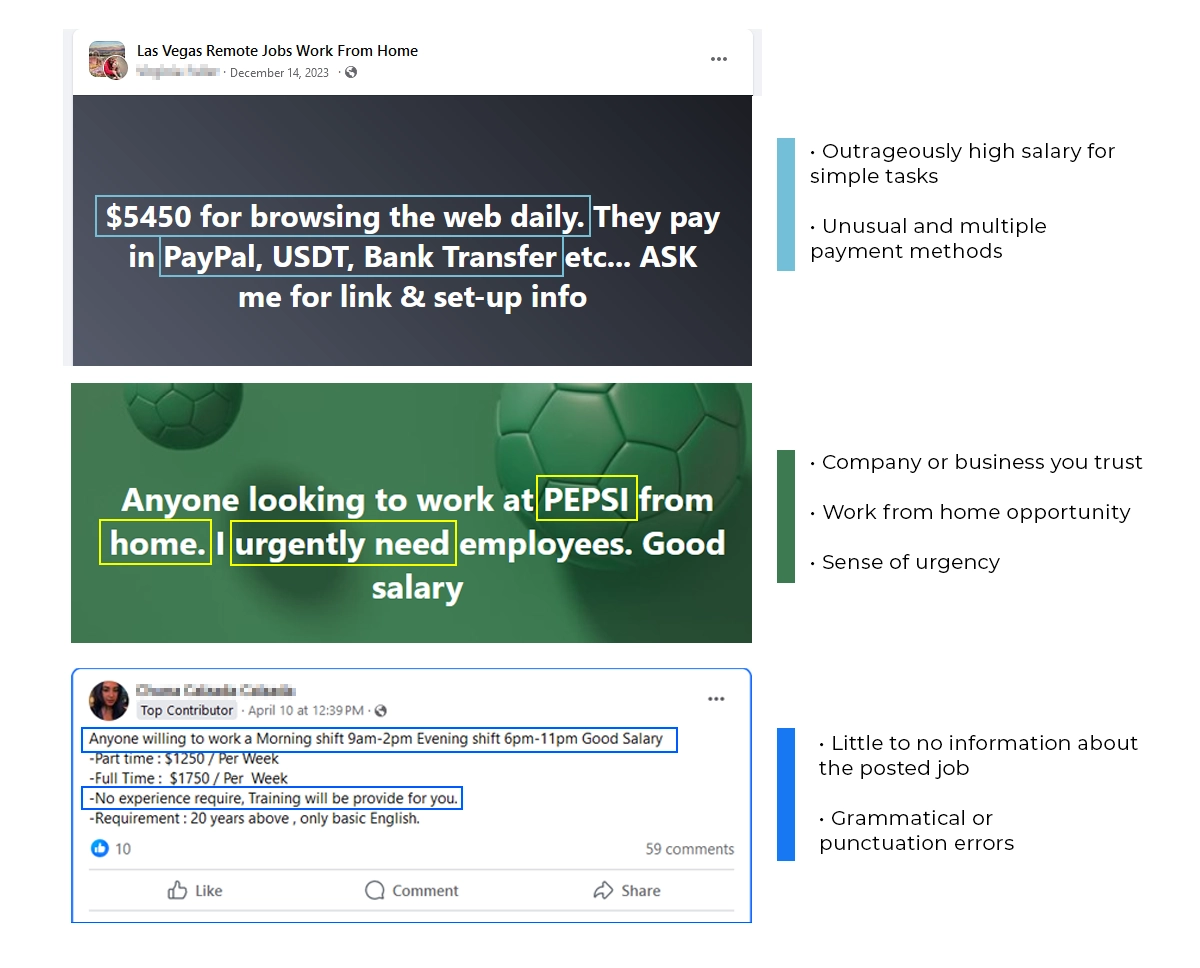
Report the Scam – You Can Help Protect Others
If you’ve been targeted or have been a victim of a job scam, you are not alone. These scams are designed to trick smart, capable people and there’s no shame in being manipulated by a professional liar. The important thing is to report it, share your experience to help others, and take steps to protect your information going forward.
If you believe you've encountered a job scam, report it to the platform you found the listing on, then file reports with the Federal Trade Commission (FTC) and the Internet Crime Complaint Center (IC3). Your report could stop someone else from becoming the next victim.
How Seraph Secure Can Help
Seraph Secure can help protect against scams like these and many others that hide in plain sight online. Our AI-powered tools and threat detection systems are built to alert you before scammers can strike.
We’re on a mission to make the internet a safer place for everyone – including job seekers. While Seraph Secure won’t stop you from conversing with a scammer, it can block known scam websites and block any attempts by scammers to access your computer. While you focus on building your future, we’ll focus on protecting it. Download Seraph Secure anti-scam protection for free.
Finding the right job should be about growth, not grief. Real opportunities won’t pressure you, confuse you, or disappear if you ask questions.
Happy job hunting, you’ve got this!
– The Seraph Secure Team

